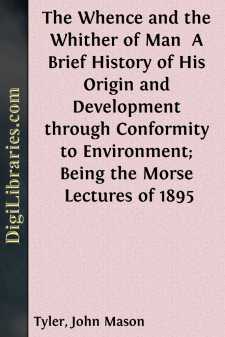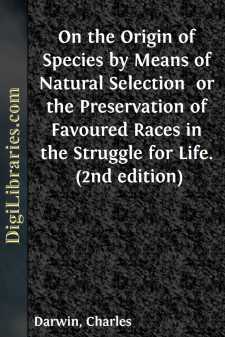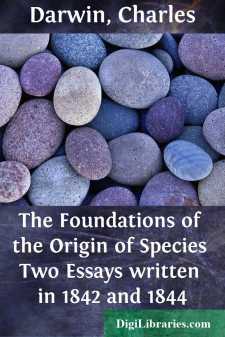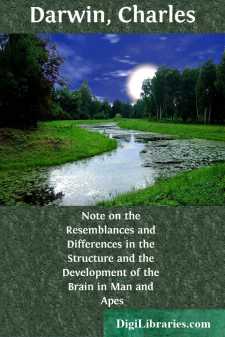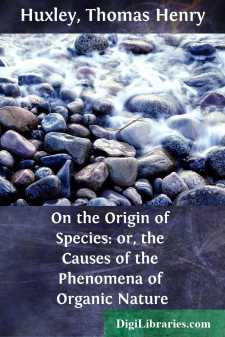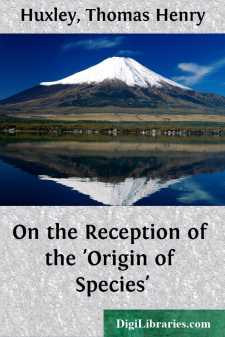Science
- Astronomy 18
- Biology 40
- Chemistry 13
- Electricity 1
- General 38
- History 6
- Light 1
- Paleontology 2
- Philosophy & Social Aspects 1
- Physics 3
- Relativity 2
- Study & Teaching 1
- Waves & Wave Mechanics 1
Science Books
Sort by:
by:
John Mason Tyler
CHAPTER I THE PROBLEM: THE MODE OF ITS SOLUTION The story of a human life can be told in very few words. A youth of golden dreams and visions; a few years of struggle or of neglected opportunities; then retrospect and the end."We come like water, and like wind we go." But how few of the visions are realized. Faust sums up the whole of life in the twice-repeated word versagen, renounce, and...
more...
PREFATORY NOTE. In complying with the wish of the publishers of Professor Haeckel's reply to Professor Virchow, that I should furnish a prefatory note expressing my own opinion in respect of the subject-matter of the controversy, Gay's homely lines, prophetic of the fate of those "who in quarrels interpose," emerge from some brain-cupboard in which they have been hidden since my...
more...
by:
Charles Darwin
INTRODUCTION. When on board H.M.S. 'Beagle,' as naturalist, I was much struck with certain facts in the distribution of the inhabitants of South America, and in the geological relations of the present to the past inhabitants of that continent. These facts seemed to me to throw some light on the origin of species—that mystery of mysteries, as it has been called by one of our greatest...
more...
INTRODUCTORY. The problem of the genesis of species stated.—Nature of its probable solution.—Importance of the question.—Position here defended.—Statement of the Darwinian Theory.—Its applicability to details of geographical distribution; to rudimentary structures; to homology; to mimicry, &c.—Consequent utility of the theory.—Its wide acceptance.—Reasons for this, other than, and...
more...
by:
William Bateson
In seeking to discover Darwin's relation to his predecessors it is useful to distinguish the various services which he rendered to the theory of organic evolution. (I) As everyone knows, the general idea of the Doctrine of Descent is that the plants and animals of the present day are the lineal descendants of ancestors on the whole somewhat simpler, that these again are descended from yet simpler...
more...
by:
Charles Darwin
INTRODUCTION We know from the contents of Charles Darwin’s Note Book of 1837 that he was at that time a convinced Evolutionist. Nor can there be any doubt that, when he started on board the Beagle, such opinions as he had were on the side of immutability. When therefore did the current of his thoughts begin to set in the direction of Evolution? We have first to consider the factors that made for such...
more...
by:
Charles Darwin
The controversy respecting the nature and the extent of the differences in the structure of the brain in man and the apes, which arose some fifteen years ago, has not yet come to an end, though the subject matter of the dispute is, at present, totally different from what it was formerly. It was originally asserted and re-asserted, with singular pertinacity, that the brain of all the apes, even the...
more...
IN the preceding five lectures I have endeavoured to give you an account of those facts, and of those reasonings from facts, which form the data upon which all theories regarding the causes of the phenomena of organic nature must be based. And, although I have had frequent occasion to quote Mr. Darwin—as all persons hereafter, in speaking upon these subjects, will have occasion to quote his famous...
more...
MR. DARWIN'S long-standing and well-earned scientific eminence probably renders him indifferent to that social notoriety which passes by the name of success; but if the calm spirit of the philosopher have not yet wholly superseded the ambition and the vanity of the carnal man within him, he must be well satisfied with the results of his venture in publishing the 'Origin of Species'....
more...
ON THE RECEPTION OF THE 'ORIGIN OF SPECIES.' To the present generation, that is to say, the people a few years on the hither and thither side of thirty, the name of Charles Darwin stands alongside of those of Isaac Newton and Michael Faraday; and, like them, calls up the grand ideal of a searcher after truth and interpreter of Nature. They think of him who bore it as a rare combination of...
more...


